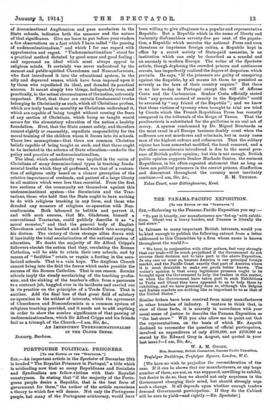THE PANAMA-PACIFIC EXPOSITION.
[To Tan EDIT. Or THE SPZCI,7074.1 SIE,—Referring to the Panama-Pacific Exposition you say "To put it bluntly, our manufacturers are 'fed-up 'with exhibi- tions. Ghent was a heavy burden, and Panama is literally the last straw."
In fairness to many important British interests, would you be kind enough to publish the following extract from a letter addressed to this Committee by a firm whose name is known throughout the world P- " We here, in conjunction with other potters, feel very strongly that our trade will be much prejudiced if the Government do not reverse their decision not to take part in the above Exposition. In any case toe muse go, because America is our principal foreign market, and the Pacific Coast exactly that part of America where it is most desirable to snake our goods better known. The writer's opinion is that every legitimate pressure ought to be brought upon the Government to help the traders in this matter, as when the Government have taken part in such Exhibitions as Turin and Ghent they have appealed to us to help them by exhibiting, and we have generally done so, although the Belgian and Italian markets are nothing like so important to us as that of the United States."
Similar letters have been received from many manufacturers in other branches of industry. I venture to think that, in view of these facts, it is scarcely in accordance with your usual sense of justice to describe the Panama Exposition as "the last straw." Will you also allow me to point out that the representations, on the basis of which Mr. Asquith declined to reconsider the question of official participation, involved an expenditure of only £100,000, not £210,000 as stated by Sir Edward Grey in August, and quoted in your last issue am, Sir, Sre., W. A. M. GOODE,
Hon. Secretary, British Committee, Panama-Pacific Exposithm,
Trafalgar Buildings, Trafalgar Square, London, W.C.
[We have no wish to prejudice the reconsideration of the case. If it can be shown that our manufacturers, or any large number of them, are not, as was supposed, unwilling to exhibit, but desire to do so, then we should not only acquiesce in the Government changing their mind, but should strongly urge such a change. It all depends upon whether enough traders demand Government participation. If they do the Cabinet will be sure to yield—and rightly.—En. Spectator.]


















































 Previous page
Previous page